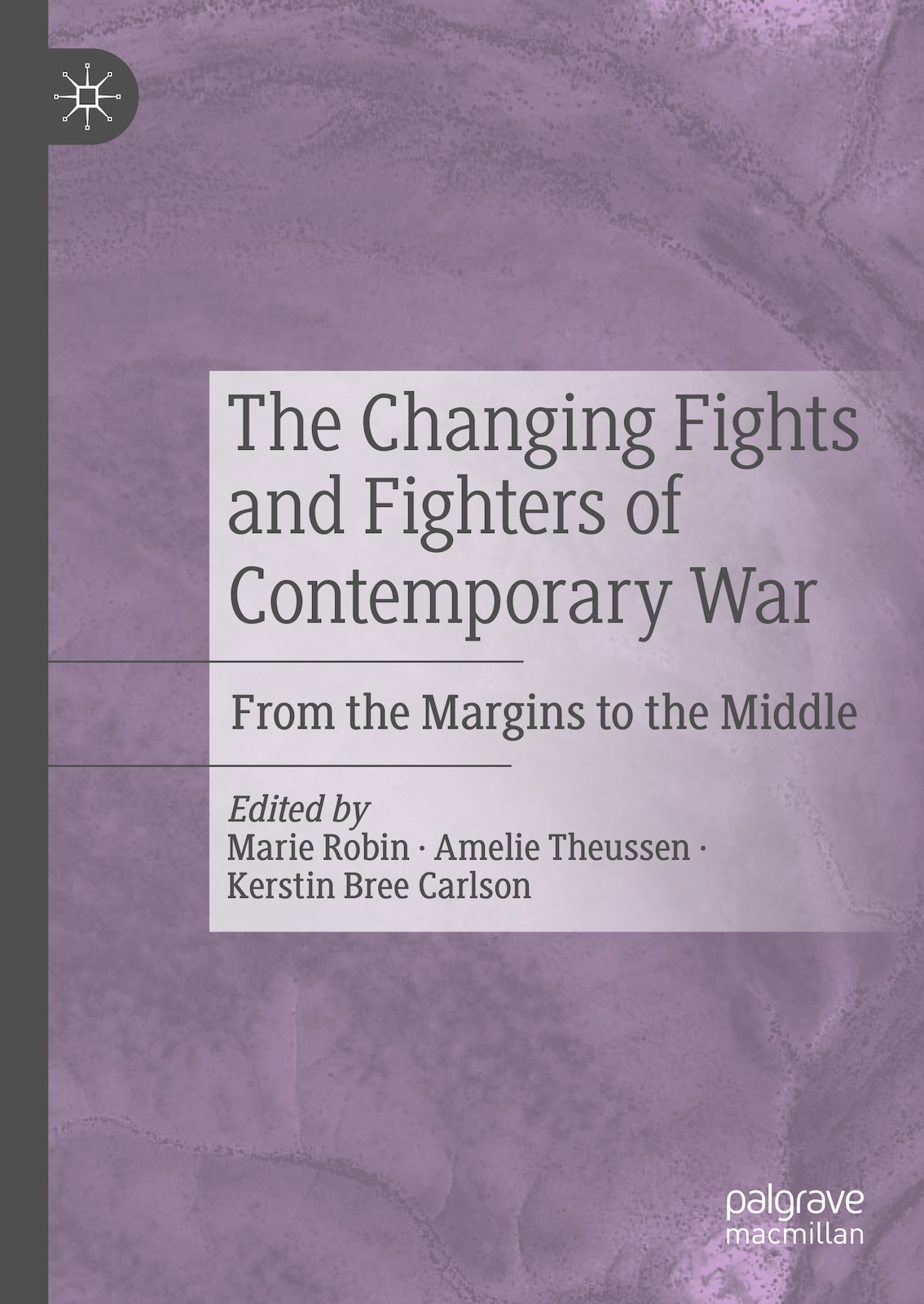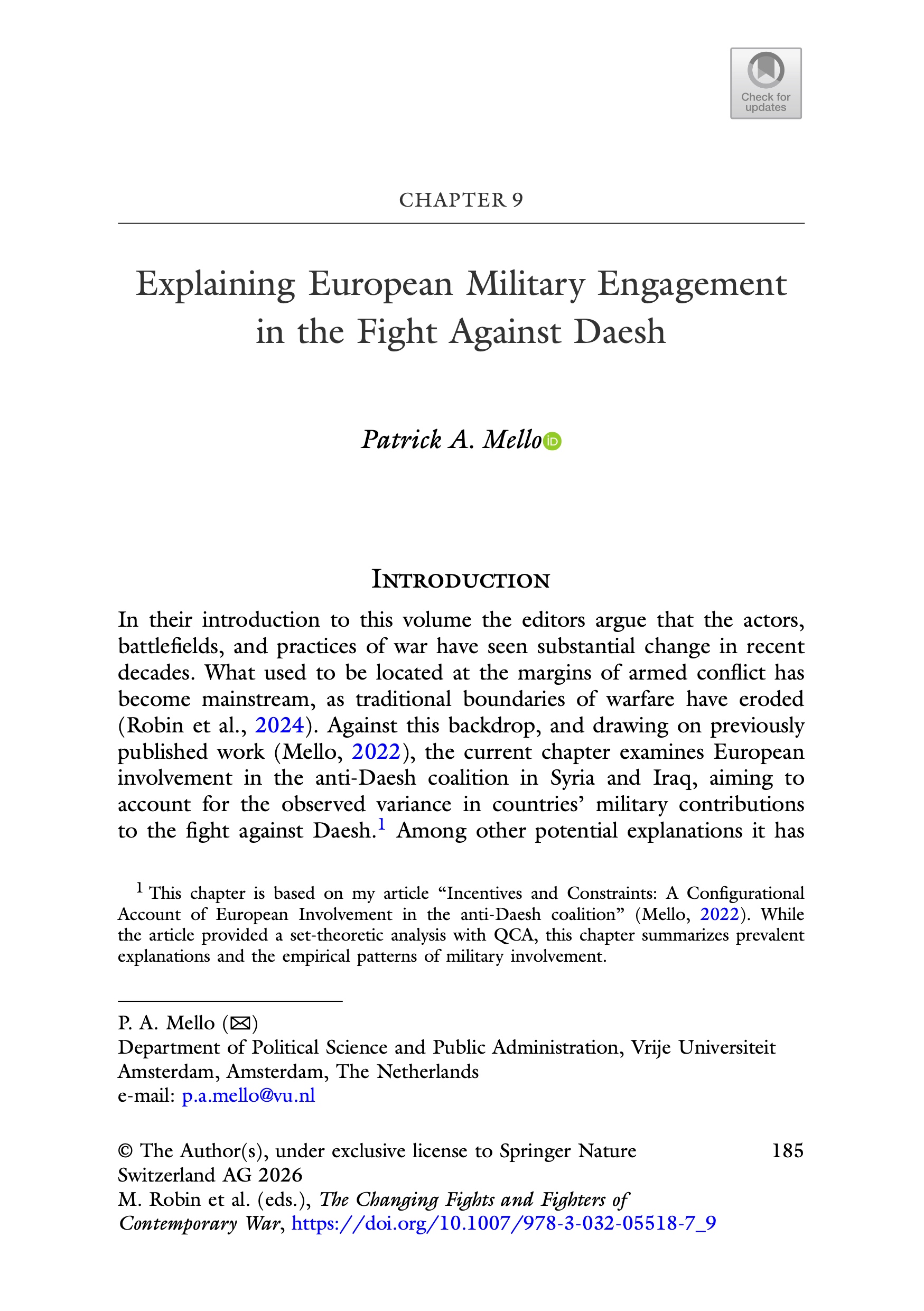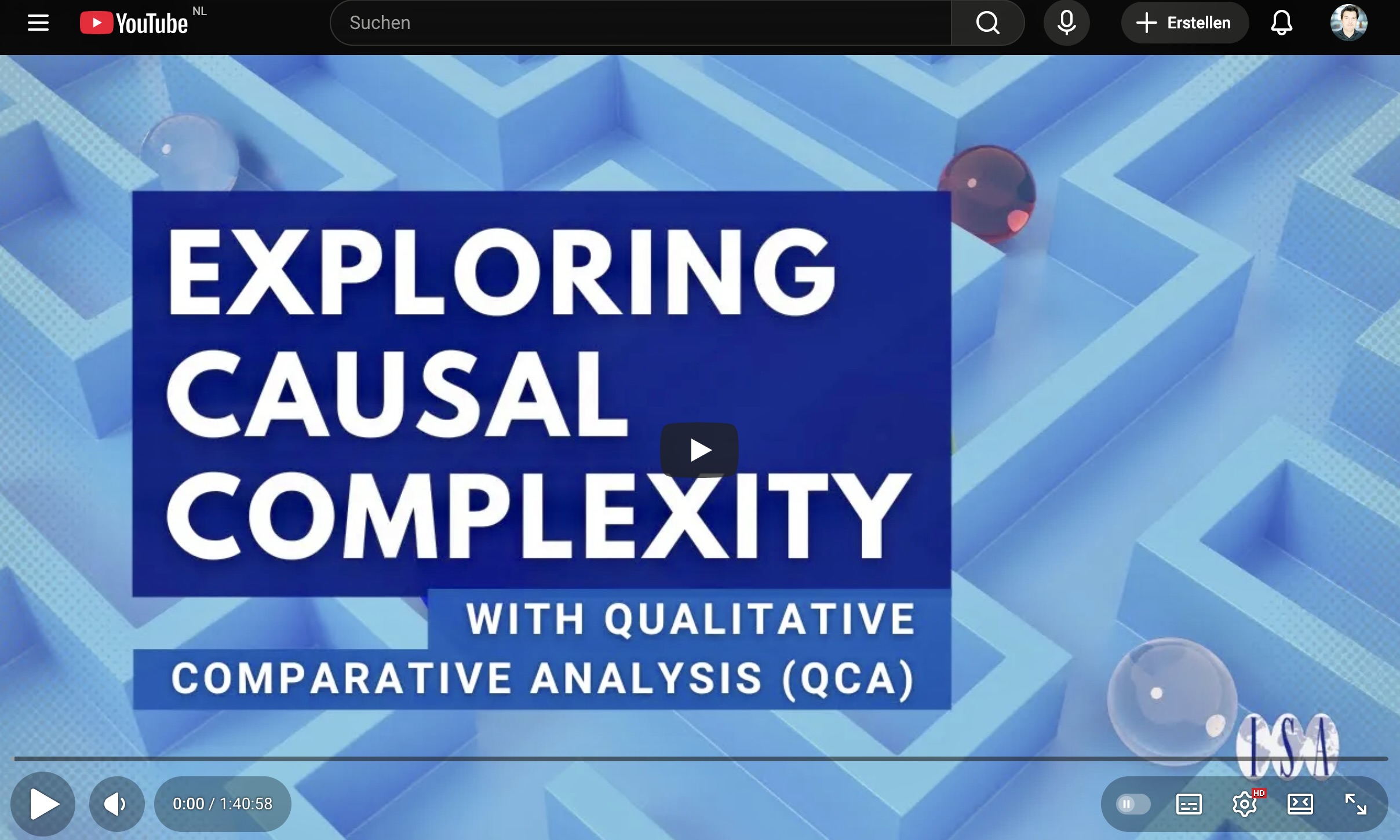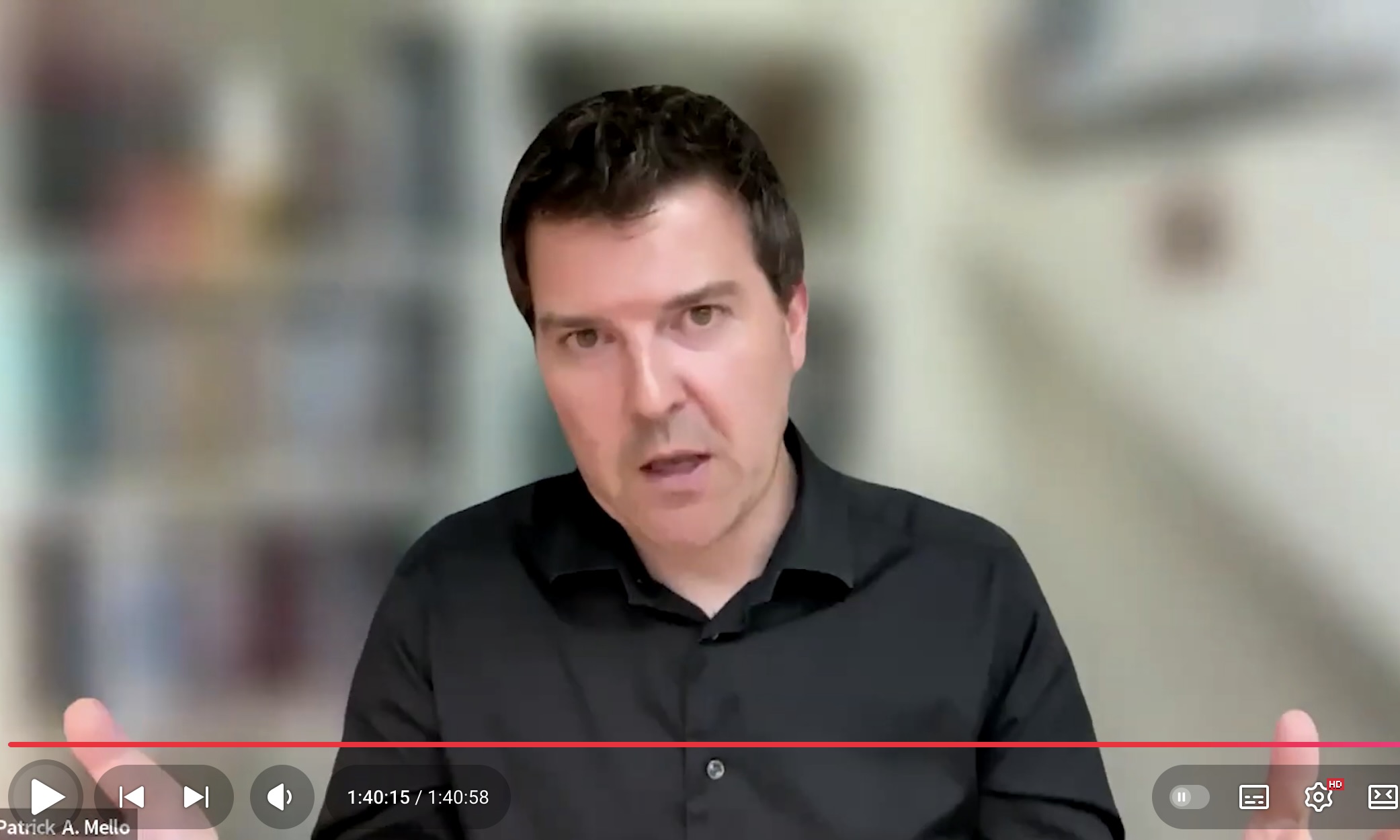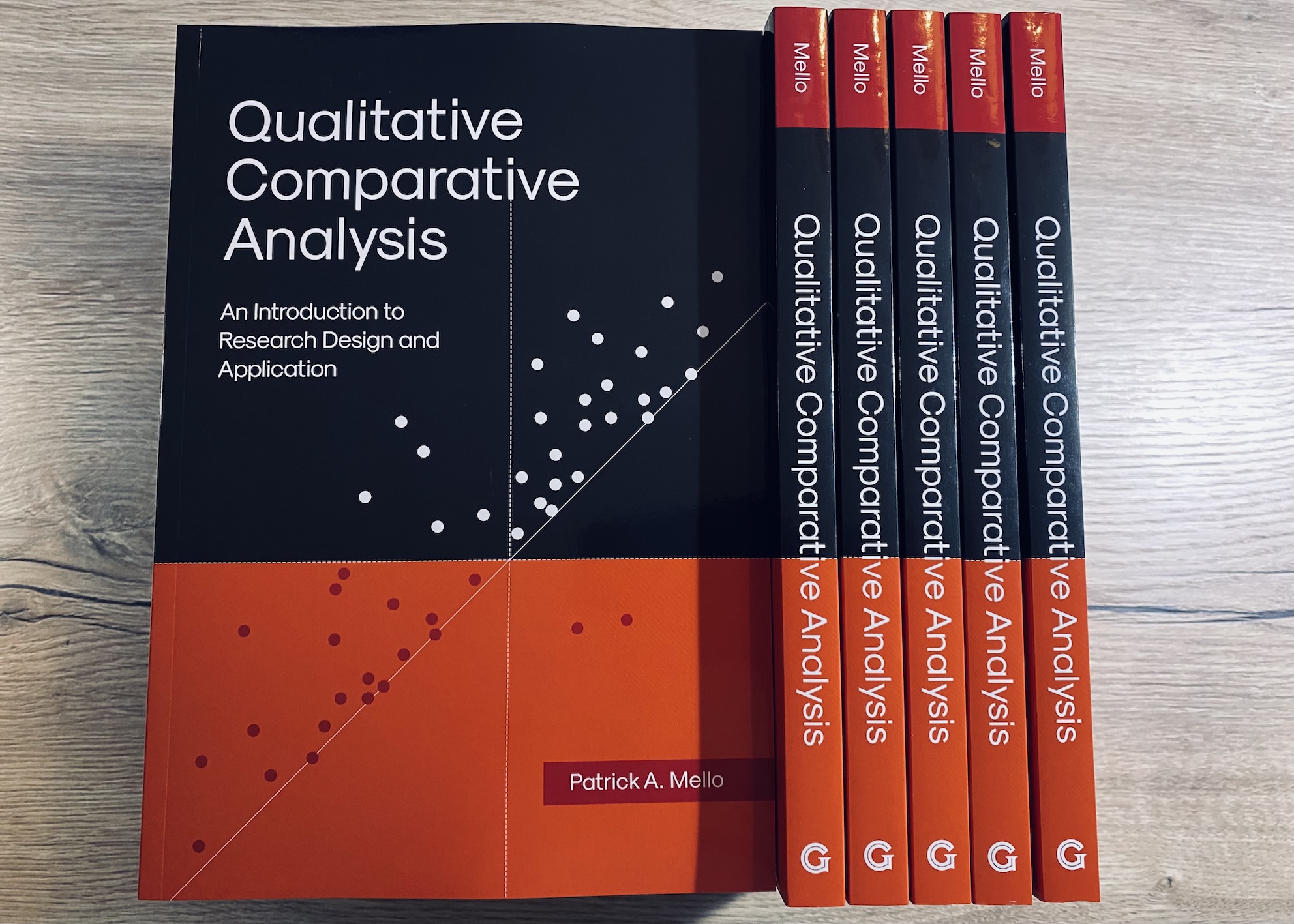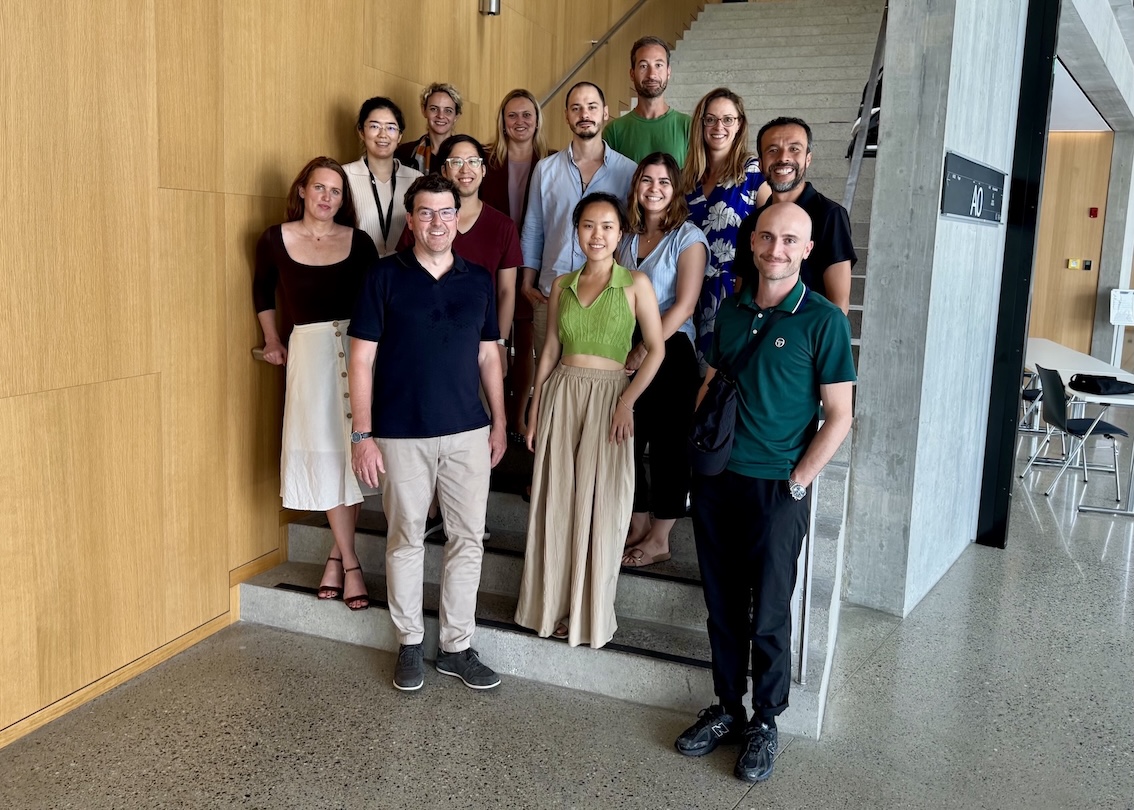The recently published book The Changing Fights and Fighters of Contemporary War, edited by Marie Robin (Leiden University), Amelie Theussen (Royal Danish Defense College), and Kerstin Bree Carlson (Roskilde University), includes my chapter “Explaining European Military Engagement in the Fight Against Daesh”. A first draft of this chapter was presented in 2020 at the annual conference of the Center for War Studies (CWS) conference of the University of Southern Denmark. Many thanks to Marie Robin, Amelie Theussen, and Kerstin Bree Carlson for shepherding this book project to publication, despite numerous obstacles along the way! Thanks also for the constructive comments and suggestions on my chapter, also to the other participants and discussants at the CWS conference.
-
Book Chapter on European Military Engagement in the Fight Against Daesh
-
Methodological Consultant for the University of Pennsylvania
The Perelman School of Medicine at the University of Pennsylvania has acquired funding from the National Institutes of Health (NIH) for a four-year research project to better understand the complex interplay between contextual and intervention features in care delivery for patients that undergo invasive mechanical ventilation (total budget: USD 2,816,250). The project involves nine researchers across five domains. I will serve as methodological consultant on the QCA component of the multi-method research design.
-
Lugano Summer School 2026: Register for Qualitative Comparative Analysis (QCA)

The program for the 30th Summer School in Social Sciences Methods at the Università della Svizzera italiana in Lugano, Switzerland has been announced: I’m offering Exploring Causal Complexity with Qualitative Comparative Analysis (QCA) during the week of August 17-21, 2026. For impressions from previous years, see here. This course provides a complete introduction to QCA, including R software packages (see detailed course description below). For more information, also on registration, please see the USI Summer School Website. If you have any questions about the course, please don’t hesitate to contact me.
From the course description: Causal complexity is everywhere in the social sciences—yet most researchers lack the systematic tools to capture it rigorously. In this intensive 5-day workshop (28 contact hours) you will learn how to design, apply, and publish empirical research with Qualitative Comparative Analysis (QCA) in the R software environment. The course follows the comprehensive framework developed in Mello (2021, Georgetown University Press), progressing systematically from the foundations of QCA to advanced applications.
The course emphasizes research design alongside analytical techniques, addressing both conceptual foundations and practical application of QCA. You will follow an ideal-typical research process, starting with empirical illustrations of where and how QCA is used in the social sciences. Foundational sessions explore key principles, such as set theory, Boolean algebra, and the calibration of crisp and fuzzy sets, while guiding you through the analytical protocol for identifying patterns of causal complexity using truth tables and Boolean minimization.
The course progresses step by step, from study design to the interpretation of results, incorporating hands-on exercises with examples from published studies and R script templates to adapt for your own purposes. Advanced topics—including multi-method research, robustness tests, and recent developments in QCA—will be tailored to your needs and research interests. Opportunities to present your individual project and explore potential applications further enhance the workshop.
Designed to be inclusive, the workshop welcomes participants at all levels—from PhD students to senior researchers—and strikes a balance between theory, practical exercises, and individualized support. A strong emphasis on collaboration and dialogue in a small group setting ensures ample time for consultation, group discussions, and networking. By the end of the workshop, you will be equipped with the theoretical knowledge and practical skills needed to apply QCA effectively, providing a robust framework for addressing causal complexity in comparative social science research.
-
European QCA Conference 2025
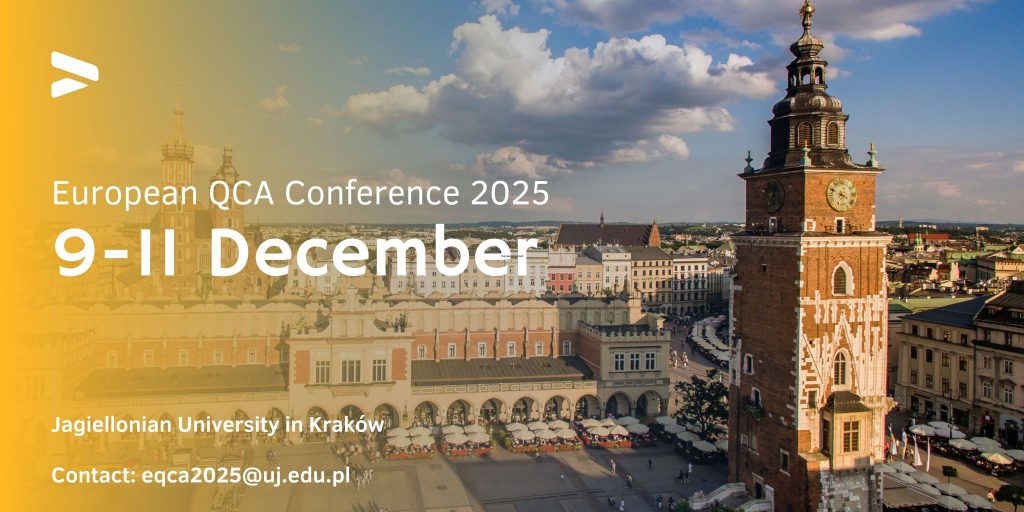
From December 9 to 11, I was invited to participate in the European QCA Conference 2025 at Jagiellonian University in Kraków. The annual EQCA conference brings together researchers from across the social sciences who engage in QCA-related work. The event is split into a Paper Development Workshop (PDW), where QCA experts discuss and comment on work in progress, and an Expert Workshop with several panels on developments in QCA and related methods. Besides chairing one of the PDW sessions, I also taught a module on set-theoretic analysis for academic teachers in organizational and media studies. During the expert workshop, I presented a paper on “Solutions in Qualitative Comparative Analysis: Evaluating Model Similarity”, co-authored with Bart Cambré (University of Antwerp) and Barbara Vis (Utrecht University). EQCA 2025 was organized by Anna Sławik, Aleksandra Rudawska, Seweryn Krupnik and Esther Staes. Many thanks to the organizing team for creating such a superb event!
-
ISA Talk on Qualitative Comparative Analysis available on YouTube
On September 17, I gave a talk on “Exploring Causal Complexity with Qualitative Comparative Analysis (QCA)” for the International Studies Association (ISA). The recording has now been made available on ISA’s YouTube channel. In my talk, I provide a compact introduction to the method and approach of QCA, with a bit of background on its methodological evolution, complemented by an empirical illustration (based on this open access article and replication data). In the last part of the talk, I address questions from the audience. ISA is the scholarly association devoted to the discipline of international studies. The association represents over 100 countries and has over 7,000 members worldwide (see data here). Thanks to Sarah Dorr, Kat Folker, and everyone at ISA for making this event possible, and especially to the live participants–it was wonderful to see that 86 people from 27 countries joined this session online.
-
Qualitative Comparative Analysis (QCA) at the Lugano Summer School 2025
During the week of August 11-15, I taught the course “Exploring Causal Complexity with Qualitative Comparative Analysis (QCA)” at the 29th Summer School in Social Sciences Methods of the Università della Svizzera italiana in Lugano, Switzerland. This has been the 7th time teaching this course in Lugano (since 2016). Thanks to the organizing team and to all participants for their engagement and motivation! It is always a pleasure to see how QCA can be applied to diverse settings across the social sciences. If you’re interested in taking part in 2026, please let me know (registration usually opens in December/January). For impressions from previous years of the USI Summer School, see here.

-
Info Session on ISA’s Dissertation Completion Fellowship on YouTube
A recording of the online information session on the Dissertation Completion Fellowship of the International Studies Association (ISA) has been posted on YouTube. Dissertation Completion Fellowships (DCF) are open to applicants from across the social sciences and humanities working in the field of international studies, broadly conceived. The DCF Committee is a permanent standing committee of the ISA. Its members are appointed by the ISA President and confirmed by the ISA Governing Council. The fellowship program aims to support graduate students in the final stages of writing their dissertation, typically in the last year of their PhD program. While the fellowship is open to all eligible graduate student members of ISA, the committee particularly encourages applications from groups, genders, and nationalities that have been historically under-represented in the field of international studies. Preference will also be given to students without access to other sources of funding to assist with dissertation completion. For more information, see the Call for Applications on the ISA website.
-
12th European Workshops in International Studies (EWIS) in Krakow
On July 2-4, I attended the 12th European Workshops in International Studies (EWIS) in Krakow, Poland. I presented the paper “Pacifism, Isolationism or Anti-Americanism? Explaining Public Opposition to Supporting Ukraine against Russia’s War of Aggression”, co-authored with Wolfgang Wagner, in the workshop “Configuring Collective Deterrence and Defense on NATO’s Northern and Eastern Flanks: Towards a Resilient Force Posture”, organized and chaired by Monika Sus (Polish Academy of Sciences) and Tobias Bunde (Hertie School). Thanks to everyone involved for the engaged and constructive discussions around European security!


-
Presentation at Pre-NATO Summit Panel
On June 23, I had the opportunity to speak in a pre-NATO Summit panel about my research on the German “Zeitenwende” (watershed) in foreign and security policy, drawing on two recently published open-access articles (here and here) and ongoing research. Thanks for the engaged discussions to my co-panelists Laurien Crump, Giray Sadik, Nathan Meershoek, and our moderator Kılıç Buğra Kanat, and thanks to İsmail Erkam Sula of the Republic of Türkiye Directorate of Communications for the kind invitation to this event.



-
Strategische Zeitenwende? Die Nationale Sicherheitsstrategie als Wendepunkt deutscher Außenpolitik
In der Zeitschrift für Politik ist ein Sonderband erschienen zum Thema “Integrierte Sicherheit für Deutschland? Die Nationale Sicherheitsstrategie der Bundesrepublik Deutschland”, herausgegeben von Holger Janusch und Thomas Dörfler (Hochschule des Bundes für öffentliche Verwaltung). In 16 Beiträgen werden die Entstehung, Bedeutung, Politikfelder und rechtliche Einordnung der 2023 veröffentlichten Sicherheitsstrategie erörtert. Mein Beitrag “Strategische Zeitenwende? Die Nationale Sicherheitsstrategie als Wendepunkt deutscher Außenpolitik” widmet sich der Frage, inwiefern die Strategie einen Wandel in den Grundorientierungen deutscher Außenpolitik markiert. Alle Beiträge des Sonderbandes sind dank Open Access frei zugänglich.
Zusammenfassung: Russlands Angriffskrieg auf die Ukraine bedeutet eine sicherheitspolitische Zeitenwende für Deutschland und Europa. Neben der Zeitenwende-Rede von Bundeskanzler Olaf Scholz hat sich die Neubewertung des sicherheitspolitischen Umfelds nicht zuletzt in der von der Bundesregierung im Juni 2023 vorgestellten Nationalen Sicherheitsstrategie manifestiert. Vor diesem Hintergrund geht der vorliegende Beitrag der übergeordneten Frage nach, inwiefern die Strategie einen Wandel in den Grundorientierungen deutscher Außenpolitik markiert. Im ersten Teil des Beitrags werden Kontinuitätslinien deutscher Außenpolitik, wie Multilateralismus, Westbindung und Zivilmacht nachgezeichnet. Der zweite Teil widmet sich der Neuorientierung der deutschen Außen- und Sicherheitspolitik im Kontext der Zeitenwende. Im dritten Teil wird die Strategie hinsichtlich ihrer Bezüge auf außenpolitische Grundprinzipien und mögliche Neuerungen untersucht. Abschließend werden die Ergebnisse zusammengeführt, Kritikpunkte herausgestellt und Erklärungsansätze skizziert.
